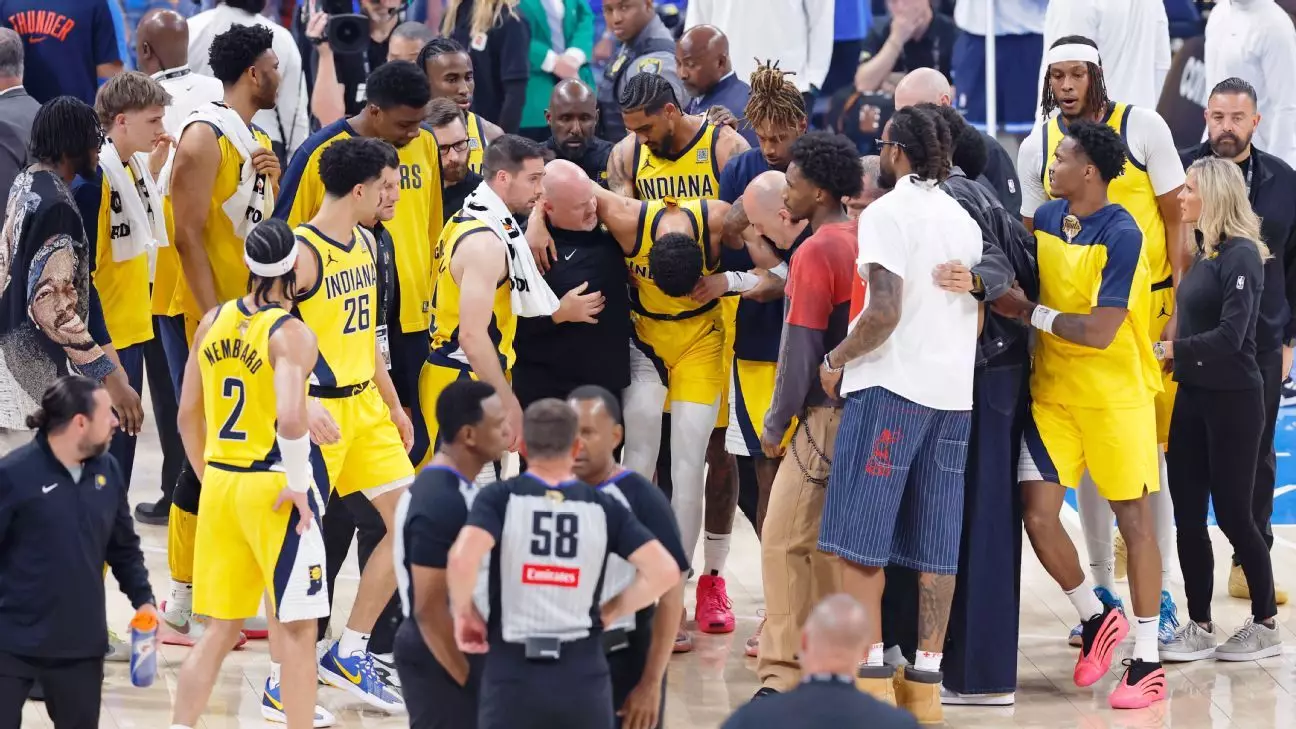In the world of professional sports, the thin line between valor and madness often blurs. Tyrese Haliburton’s experience this postseason embodies the complex dynamics of sacrifice and the unforeseen consequences that can arise from a relentless pursuit of glory. In a gripping social media post, Haliburton expressed a fierce commitment to his team and city, asserting that he would endure the pain of injury for the chance at greatness. But as compelling as his bravery is, one cannot ignore the critical question: at what cost does such a mindset come?
Haliburton’s journey through the NBA Finals came with a cavalcade of hopes, dreams, and the undeniable desire to etch his name into history. He bravely took to the court, even as he battled through a calf strain—an act of dogged determination that resonated with many fans. However, this choice ultimately led to a catastrophic torn Achilles that stopped his performance in its tracks. While the thrill of competing for a championship is intoxicating, Haliburton’s situation underscores the harsh reality of a sport that demands more than mere physical prowess. It requires a willingness to sacrifice one’s well-being, an expectation that can lead to devastating outcomes.
The Illusion of Indestructibility
Haliburton’s heartfelt message highlights not just the emotional aspect of sports but also the culture surrounding athletic performance. There exists an illusory belief among athletes that enduring pain is a badge of honor. “I wish I could count the number of times people will tell me I’m going to ‘come back stronger,'” he muses in a lament that resonates deeply with individuals who grapple with both physical and mental anguish. This cliché that hovers over the athletic community can inadvertently glorify the process of playing through pain, pushing individuals to jeopardize their long-term health for fleeting moments of glory.
This mentality, particularly pervasive in sports culture, is troubling. Athletes like Haliburton, while heroic in their relentless pursuit, become unwitting victims of the system that glorifies suffering. They are hailed as warriors yet left to grapple alone with the repercussions of their decisions. Haliburton’s emotional outpouring should spark conversations around the pressures athletes face. Should they risk their health in desperate attempts to secure victories, or should their well-being be prioritized ahead of accolades? It’s a conflict that digs deep into the ethos of sports—an ethos that often needs to evolve to foster better mental and physical health for players.
Healing and Reflection: The Path Ahead
While many may view Haliburton’s resolve as a display of immense courage, there’s a sobering reality wrapped within his words: healing is a multi-faceted journey, often integrating both the physical and mental realms. His candid acknowledgment of a “mind” in pain speaks volumes, resonating with countless athletes who face similar battles. The pressure to return to form can lead to anxiety and mental setbacks, which can be just as debilitating as a physical injury.
However, Haliburton’s focus on gratitude amid pain offers a glimmer of hope. He speaks not as a victim but as an individual determined to navigate this new chapter in his life with resilience. “I don’t ‘have to’ go through this; I get to go through this,” he reflects, redefining adversity into an opportunity for growth. This perspective is refreshing in a climate saturated with despair and disappointment. While healing may be a long and arduous process, his embrace of this journey showcases a fundamentally optimistic worldview, allowing space for personal transformation rather than just an athletic comeback.
A Call for Change in Sports Culture
As Haliburton embarks on his recovery, there is a pressing need for a shift in how sports culture acknowledges pain and injury. The voice of one passionate athlete can catalyze sweeping changes, encouraging both fans and franchises to prioritize mental and physical health over a relentless pursuit of wins. It’s time to challenge the glorification of playing hurt and champion a culture that celebrates long-term health, training smart, and the holistic well-being of athletes.
Haliburton’s story, while deeply personal, illuminates a larger narrative about the cost of passion in sports—a narrative that is complex, painful, and ripe for reflection. At its core, it calls for a reassessment of what it truly means to support our athletes, standing beside them in their triumphs and tribulations, rather than blindly expecting them to push through, no matter the consequences.

